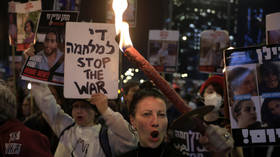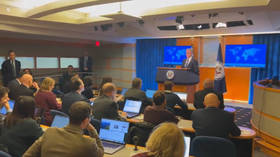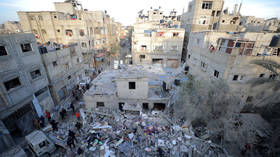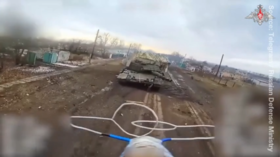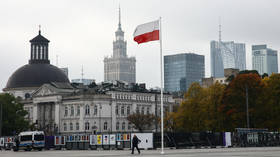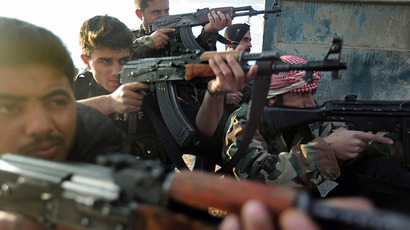UN peacekeeper hostages in Syria are ‘in a safe place’ according to video
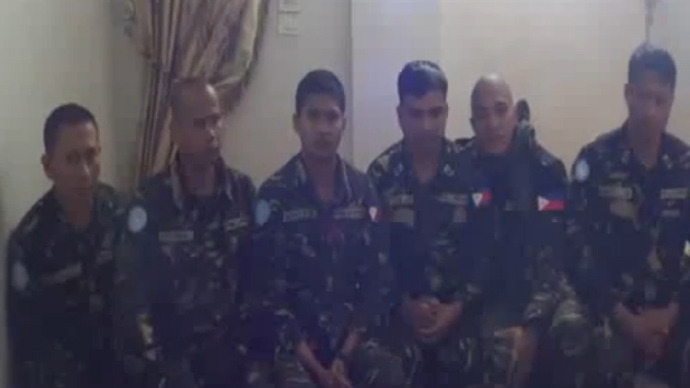
Six UN peacekeepers detained by Syrian fighters on Wednesday are safe, according to footage released by the activists. The video – which shows six men lined up in their uniforms – did not include information on the remaining 15 hostages.
The 21 Filipino UN peacekeepers were captured by Syrian rebels in Golan Heights. However, one of the men in the footage – who identified himself as a captain in the UN Filipino battalion - said that he and his men are in “a safe place.”
He said that the group had been rescued by “civilian people” during bombing and artillery fire near a United Nations observation post close to the village of Jamla.
"Civilian people helped us for our safety and distributed us in different places to keep us safe. They gave us good accommodation and gave us food to eat and water to drink," he said.
The video was released by the Syrian Observatory for Human Rights, which says it has been speaking “directly” to a spokesperson for the Yarmouk Brigades – the group of rebels which captured the peacekeepers.
A spokesman for the observatory said on Thursday that the captors “assured us they are not going to harm the hostages in any way and they’re treating them as guests.” The activist group says the insurgents are pushing for government forces to pull back heavy weaponry and allow villagers to return to villages they have fled because of recent fighting.
Earlier Thursday, the Philippines’ foreign ministry issued a statement on the kidnapping, saying that the detention of the Filipino peacekeepers violates international law.
“The Philippines is working very closely with the UN, the US, the UK, France, and Germany for the early and safe release of the peacekeepers,” Philippines Foreign Affairs Spokesperson Raul Hernandez said in a statement.
Twenty-one Filipino UN peacekeepers were detained in Golan Heights on Wednesday. The UN and Arab League officials are reportedly negotiating with the Syrian rebels.
Who is to blame?
As the hostage crisis continues to unfold, political analyst Ibrahim Alloush says those who support the rebels are responsible for the crime – not the rebels themselves.
“If you look at the whole picture, you will easily find that the problem is not with those rebels, but with those who are supporting them – the ones who are arming them, financing them, and providing them with political support,” he told RT.
But Alloush’s opinions are a far cry from those of the Arab and western states – which continue to support the Syrian opposition.
On Wednesday, the Arab League issued a statement saying Arab states are free to offer military support to the Syrian rebels and has offered them a seat. It was a ground-breaking move for the organization, which previously said the Syrian opposition should only be supported by humanitarian and diplomatic means.
On the same day, UK Foreign Secretary William Hague announced the UK would increase its aid to rebel forces in Syria.
The aid amounts to 13 million pounds (US$19.5 million) and was made possible by changes to the terms of the EU arms embargo on Syria, which were agreed last week. The aid includes armored vehicles, body armor, search and rescue, communications, and disease prevention equipment.
Meanwhile, Germany has praised the European Union’s decision not to arm anti-government fighters in Syria, as doing so would risk regional “conflagration.”
“The decision of the EU not to lift in total the embargo was wise and was right,” German Foreign Minister Guido Westerwelle said in a statement.
The EU embargo prevents weapons from being supplied to Syrian rebels, but sanctions have been recently amended to allow more non-lethal equipment, such as body armor. The embargo rolls over every three months, and Syrian opposition officials have repeatedly called for it to be lifted.
“It is necessary to show more flexibility and to understand that we have of course to support the…opposition in a responsible way,” Westerwelle said.
According to UN estimates, more than 70,000 people have been killed since the uprising against Syrian President Bashar Assad began two years ago. More than one million refugees have fled the country.



